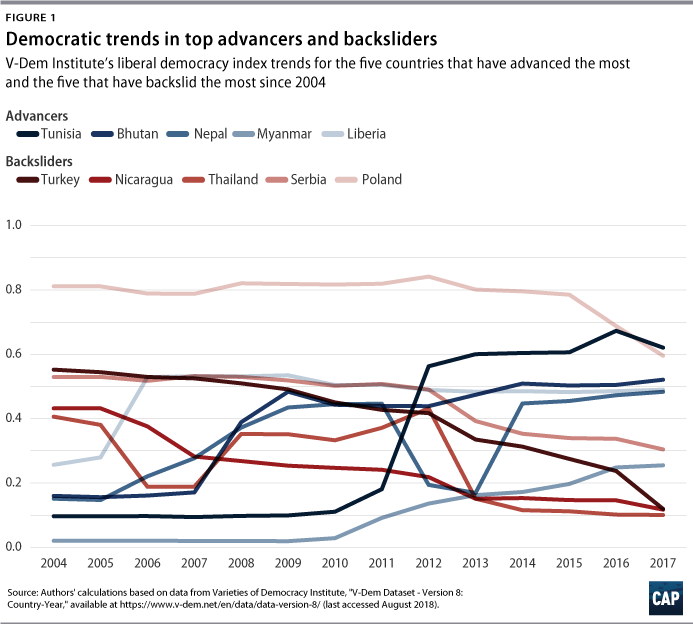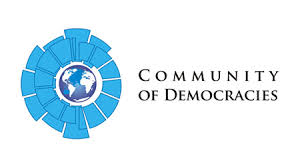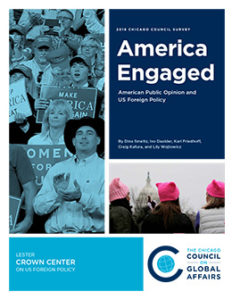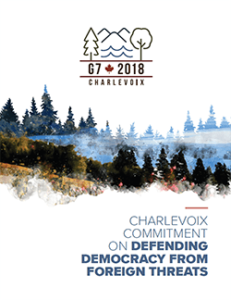
Credit: CAP
The United States should adopt a new foreign policy focused on defending and expanding the ranks of democracies around the world, argues Michael H Fuchs, a senior fellow at the Center for American Progress, and a former deputy assistant secretary of state for east Asian and Pacific affairs.
This will require re-orienting democracy assistance, finding more effective ways to support democratic movements abroad, and other efforts such as those outlined in a recent CAP report, he writes for the Guardian:
 At the core of this effort must be building a robust infrastructure for democracies to unite to protect their own democratic systems and push back against autocracy. The skeleton of this system already exists: The European Union is built on democratic principles; the G7 knits together some of the world’s richest democracies to tackle challenges such as poverty and climate change; and the Community of Democracies (CD) convenes democracies to share lessons learned about strengthening democracy.
At the core of this effort must be building a robust infrastructure for democracies to unite to protect their own democratic systems and push back against autocracy. The skeleton of this system already exists: The European Union is built on democratic principles; the G7 knits together some of the world’s richest democracies to tackle challenges such as poverty and climate change; and the Community of Democracies (CD) convenes democracies to share lessons learned about strengthening democracy.
The new U.S. Congress will adopt a fresh approach to advancing democracy and human rights, observers suggest.
Rising authoritarianism is posing challenges to liberal democracy everywhere from Brazil to Hungary to Turkey and the Philippines, according to Adam Schiff, the likely next chairman of the House Intelligence Committee.
“This rise of authoritarianism is one of the most serious national-security threats facing the country,” Schiff argued. It’s “vitally important” that the U.S. Congress “become the champion of democracy and human rights,” he told the Atlantic’s Uri Friedman.
The mid-term elections “were not about foreign policy, but their result may strengthen the political base for American support for a rules-based international order which favors democracy,” said Daniel Fried, distinguished fellow in the Atlantic Council’s Future Europe Initiative and Eurasia Center.
 “Partly as a result of Putin’s aggression and interference in American democracy, Democrats have rediscovered their inner Harry Truman—a commitment to a strong foreign policy in defense of freedom,” added Fried, a board member of the National Endowment for Democracy. “They may be able to make common cause with Republicans of like mind.”
“Partly as a result of Putin’s aggression and interference in American democracy, Democrats have rediscovered their inner Harry Truman—a commitment to a strong foreign policy in defense of freedom,” added Fried, a board member of the National Endowment for Democracy. “They may be able to make common cause with Republicans of like mind.”
In Latin America, while a stiffening of policy toward the dictatorships in Cuba, Nicaragua and Venezuela may be necessary, it should not be done at the expense of other countries and their priority issues: development, anti-narcotics assistance, anti-corruption, security, trade, and—yes—immigration, writes analyst Christopher Sabatini. Now, with Assistant Secretary of State Kimberly Breier sworn in and a shift in leadership in the House that looks beyond the “Triangle of Terrorism/Troika of Tyranny” the foundation is set for broader engagement with the rest of the hemisphere, he adds.
According to Evelyn Farkas, nonresident senior fellow at the Atlantic Council, we should “[e]xpect louder voices defending democracy.”
 Democracy advocates can take heart from the latest survey from the Chicago Council on Global Affairs, which finds that 70% of Americans want the U.S. to take an active role in world affairs and that 43% of respondents believe the decline of democracy around the world may threaten U.S. vital interests.
Democracy advocates can take heart from the latest survey from the Chicago Council on Global Affairs, which finds that 70% of Americans want the U.S. to take an active role in world affairs and that 43% of respondents believe the decline of democracy around the world may threaten U.S. vital interests.
Today, the United States must lead a global effort to stitch together the best parts of these structures into a robust democracy organization. The Community of Democracies (CD) could serve as the home, with three main goals, Fuchs adds:
- First, enable democracies to share lessons and provide technical support to one another to strengthen democratic institutions. Democracies must learn from one another to overcome challenges such as how to balance free expression with hate speech and disinformation. The CD already provides this platform, and with a reformed membership that meets at the head of state level every year it could expand its efforts.
- Second, develop common approaches to strategic issues. The threats are significant: Russia invaded a neighboring state struggling with democracy and threatens others; China is bullying neighbors in Asia. Russia and China frequently prevent United Nations action on issues related to democracy and human rights, and so democracies must band together to coordinate their own pushback against Russia, China, and others when international norms and democracy are threatened.
- Third, coordinate responses against attempts by autocracies to sow discord in democracies. Russia attacked America in an attempt to sway the 2016 presidential election to Trump, and it uses similar tactics to influence politics across Europe. China is now looking to export its own “digital authoritarianism” to equip other states with the technology to repress their peoples. Democracies must work together to understand how these threats impact them and develop strategies for defending themselves and fighting back.
 Confronting authoritarianism was on the agenda of a recent meeting in Ottawa, building on a G7 decision taken earlier this year in Charlevoix, Canada, ”to create a rapid response mechanism (RRM) on defending democracy from foreign threats.” G7 leaders adopted the “Charlevoix commitment” to:
Confronting authoritarianism was on the agenda of a recent meeting in Ottawa, building on a G7 decision taken earlier this year in Charlevoix, Canada, ”to create a rapid response mechanism (RRM) on defending democracy from foreign threats.” G7 leaders adopted the “Charlevoix commitment” to:
- Respond to foreign threats, both together and individually, in order to meet the challenges facing our democracies.
- Strengthen G7 cooperation to prevent, thwart and respond to malign interference by foreign actors aimed at undermining the democratic processes and the national interests of a G7 state.
- Establish a G7 Rapid Response Mechanism to strengthen our coordination to identify and respond to diverse and evolving threats to our democracies [not least those relating to sharp power], including through sharing information and analysis, and identifying opportunities for coordinated response.
- Share lessons learned and best practices in collaboration with governments, civil society and the private sector that are developing related initiatives including those that promote free, independent and pluralistic media; fact-based information; and freedom of expression.
- Engage directly with internet service providers and social media platforms regarding malicious misuse of information technology by foreign actors, with a particular focus on improving transparency regarding the use and seeking to prevent the illegal use of personal data and breaches of privacy.
- Support public learning and civic awareness aimed at promoting critical thinking skills and media literacy on intentionally misleading information, and improving online security and safety.
- In accordance with applicable laws, ensure a high level of transparency around sources of funding for political parties and all types of political advertising, especially during election campaigns.







